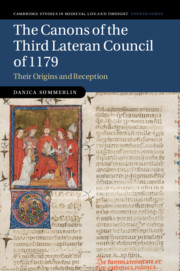Book contents
- The Canons of the Third Lateran Council of 1179
- Cambridge Studies in Medieval Life and Thought Fourth Series
- The Canons of the Third Lateran Council of 1179
- Copyright page
- Dedication
- Contents
- Tables
- Acknowledgements
- Abbreviations
- Walther-Holtzmann Kartei
- Note on Citation Styles
- Introduction
- 1 Historical Survey
- 2 Disputes, Decretals, and the 1179 Conciliar Canons
- 3 The 1179 Canons and the Schools
- 4 The Dissemination of the 1179 Canons
- 5 Use of the Canons, ca. 1179–ca. 1191
- Conclusions
- Appendix: Manuscript Listing of the 1179 Canons
- Bibliography
- Manuscript Index
- General Index
Introduction
Published online by Cambridge University Press: 08 November 2019
- The Canons of the Third Lateran Council of 1179
- Cambridge Studies in Medieval Life and Thought Fourth Series
- The Canons of the Third Lateran Council of 1179
- Copyright page
- Dedication
- Contents
- Tables
- Acknowledgements
- Abbreviations
- Walther-Holtzmann Kartei
- Note on Citation Styles
- Introduction
- 1 Historical Survey
- 2 Disputes, Decretals, and the 1179 Conciliar Canons
- 3 The 1179 Canons and the Schools
- 4 The Dissemination of the 1179 Canons
- 5 Use of the Canons, ca. 1179–ca. 1191
- Conclusions
- Appendix: Manuscript Listing of the 1179 Canons
- Bibliography
- Manuscript Index
- General Index
Summary
Ecclesiastical councils present a peculiar problem for historians of the medieval church, and especially for those trying to understand the nature of medieval papal authority. Despite an ancient pedigree, the pre-eminence of ecclesiastical councils began to fade over the course of the central Middle Ages. The centuries after 1050 are more often presented as a period in which a newly self-confident papacy rose, determined to maintain its hard-won independence from lords both secular and ecclesiastical. One result of that determination, especially when seen alongside the emergence of the papal states as a territorial conglomeration in central Italy, has been the so-called papal monarchy. For Walter Ullmann, whose interpretation still carries a certain weight, the papal monarchy reached its ‘zenith’ with Innocent III, although since the time of Barraclough scholars have debated the validity of the concept. As a result, the synod and papal council, traditional decision-making bodies of the Church, have all too often been perceived as procedural rubber stamps, especially those held under forthright pontiffs such as Innocent III.
- Type
- Chapter
- Information
- The Canons of the Third Lateran Council of 1179Their Origins and Reception, pp. 1 - 10Publisher: Cambridge University PressPrint publication year: 2019

